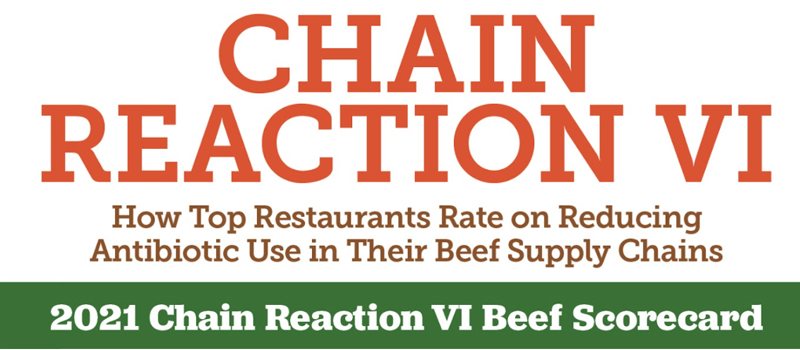5-Questions: Chain Reaction VI
1. This is the sixth edition of the Chain Reaction report. What are the big takeaways from this year’s scorecard and what trends, if any, are we seeing?
We are slowly beginning to see commitments on ending antibiotic overuse in beef. Not enough and the timelines are too long, but there is movement. On our first scorecard in 2015 when we graded all meat and poultry, we had five companies that received grades higher than "F". This year grading on beef alone, we had five companies with a "C" or above and two other "D" grades. This is a good start. Wendy's new commitment to end routine use in their beef supply chain is what we have been asking, but their timeline-- the end of 2030-- is way too far off. Hopefully with Wendy's additional commitment to release data by the end of 2024, we can hold them more accountable in the meantime. McDonald's failure to meet its commitment to set a timeline and reduction targets by the end of last year was the biggest disappointment. The other big take home is that we need to do more to protect farm and other food system workers from antibiotic resistance. They are on the front lines for resistance from antibiotic use on farms, adding another health risk to this already vulnerable group of people.
2. We love that the main focus of the report is again on antibiotic use in beef. Can you tell our readers why beef was chosen as the protein of focus? Are there any standout leaders emerging? What actions are needed to produce meaningful change in this meat sector?
When we started working on the report last year beef had consistently been the largest areas of sales of medically important antibiotics in the food sector and people eat a lot of beef in restaurants. Pork was the next contender, but people eat less pork when they eat out and sales of antibiotics for pork was lower. So, beef made sense both on reducing antibiotic overuse and on what the restaurants could influence. We then learned in December that pork had for the first time moved ahead of beef in antibiotic sales. Panera and Chipotle continue to be industry leaders in responsible antibiotic use but their smaller size and reliance on imports to meet their commitments limits their ability to move the beef industry as a whole. What we are missing in beef is a large producer stepping out to lead. As we report in Chain Reaction VI, none of the top four beef producers have taken the lead on eliminating routine antibiotic use in their systems. They are taking smaller steps, but none has done what Tyson Foods and Perdue did when they moved to significantly cut back on antibiotics in their chickens. Finally, getting to lower antibiotic use in beef is going to require taking better care of the calves. This means managing stress at weaning and moving away from inappropriate high energy diets at the feedlot.
3. Lots of antibiotics are used in the production of turkey and pork. How can we spur reform in these sectors?
We need a combination of consumers and companies that buy these meats to demand change. For pork, it would be great if we could get a company to adopt ARAC's CRAU standard as model for moving forward. Like for beef, lowering antibiotic use in pork and turkeys is going to require adjustments in how the animals are raised. For pigs that meaning keeping the bay pigs with their mothers longer and for turkeys reducing crowding. Given the higher consumption of pork at home, the grocery industry is a good target for action around pork.
4. What can our readers do to help pressure companies to call for reductions in antibiotic use in the supply chains they purchase from?
Readers can seek out meat raised without routine antibiotics. Chain Reaction VI lists labels that can be used to help identify these meats. Readers can let businesses know that you want meat raised with responsible antibiotic use. Reader can sign up to receive action alerts from the groups working on the Chain Reaction reports.
5. You’ve worked on antibiotic resistance for a long time now, what freaks you out? What gives you hope?
What freaks me out is the general inability of our society to address difficult problems like antibiotic resistance that require government action that impacts business interests. What gives me hope is the raising awareness that things need to change in the food system and more broadly.


